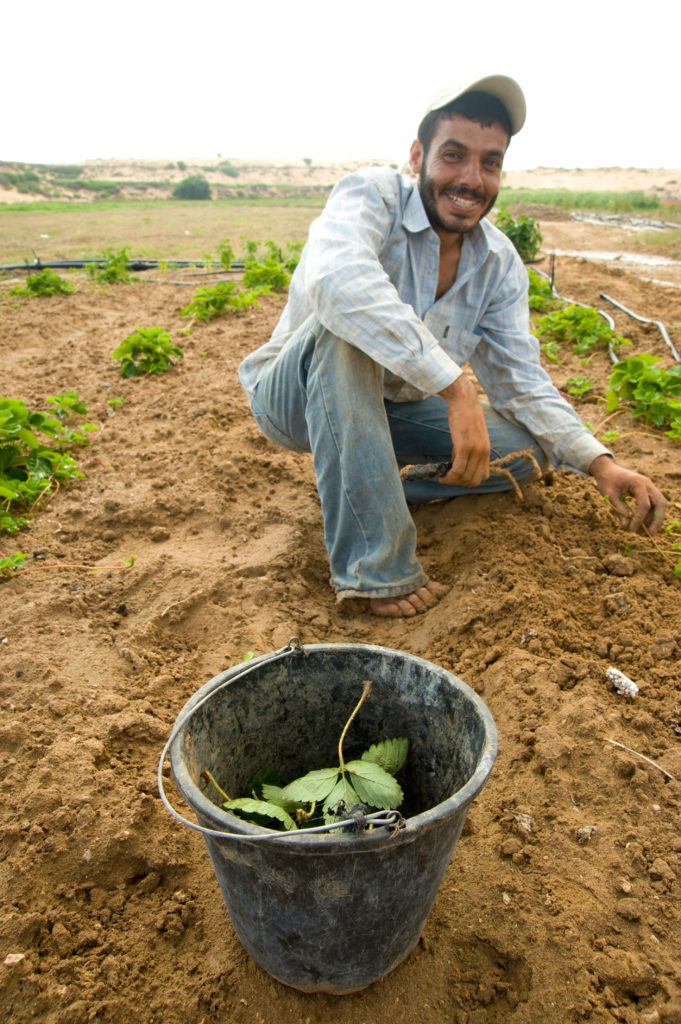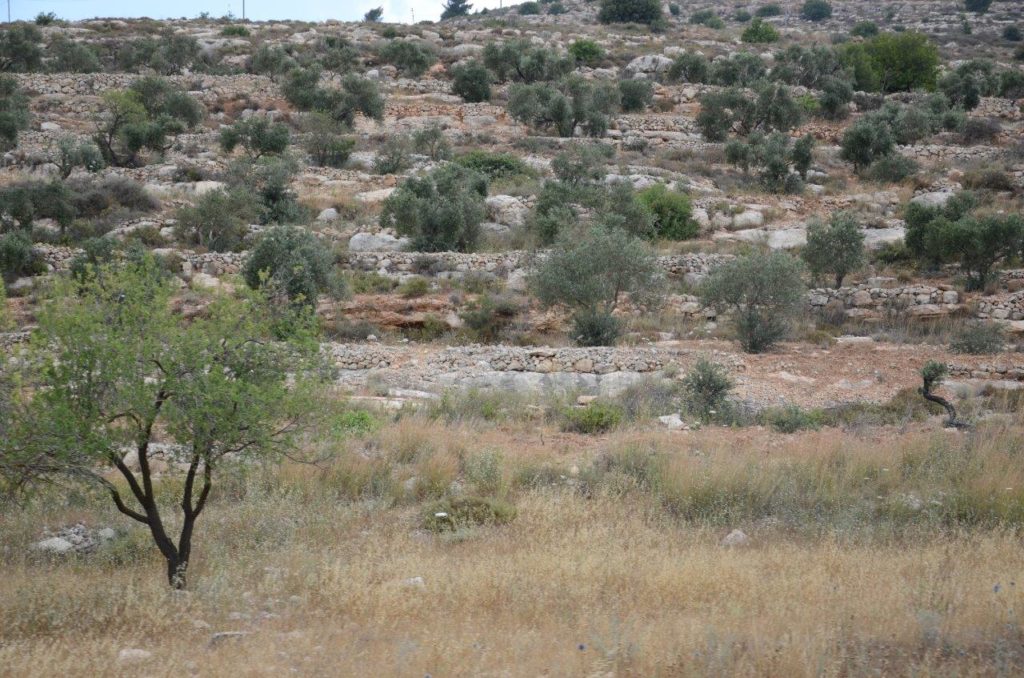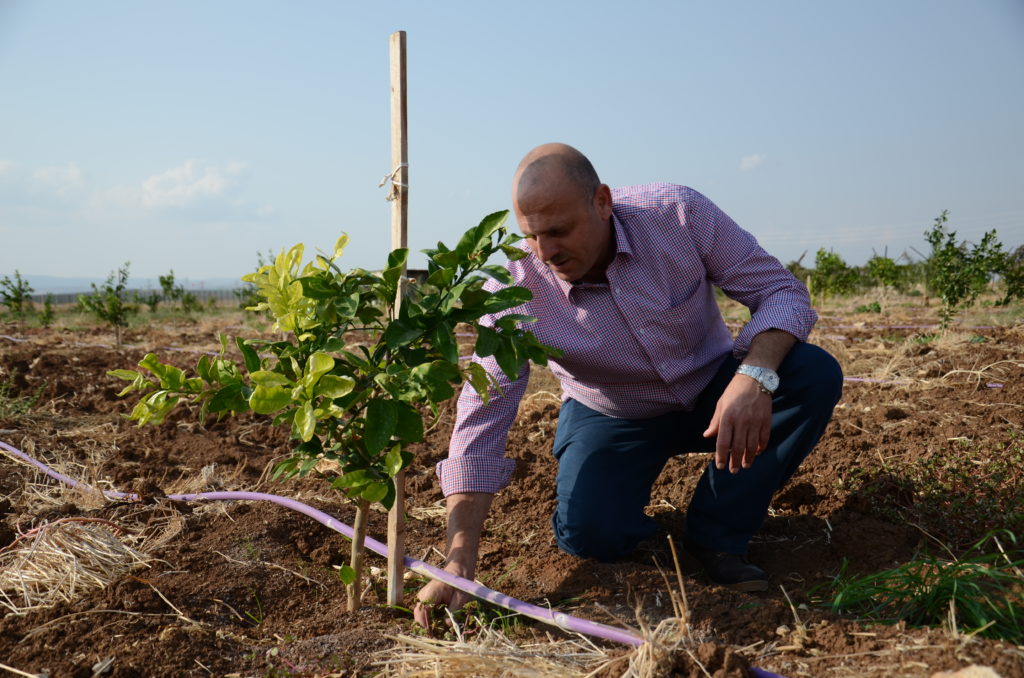World Soil Day
Posted in: Days of Observance, Voices from the field
World Soil Day 2022: Overcoming Restrictions in Palestinian Agriculture
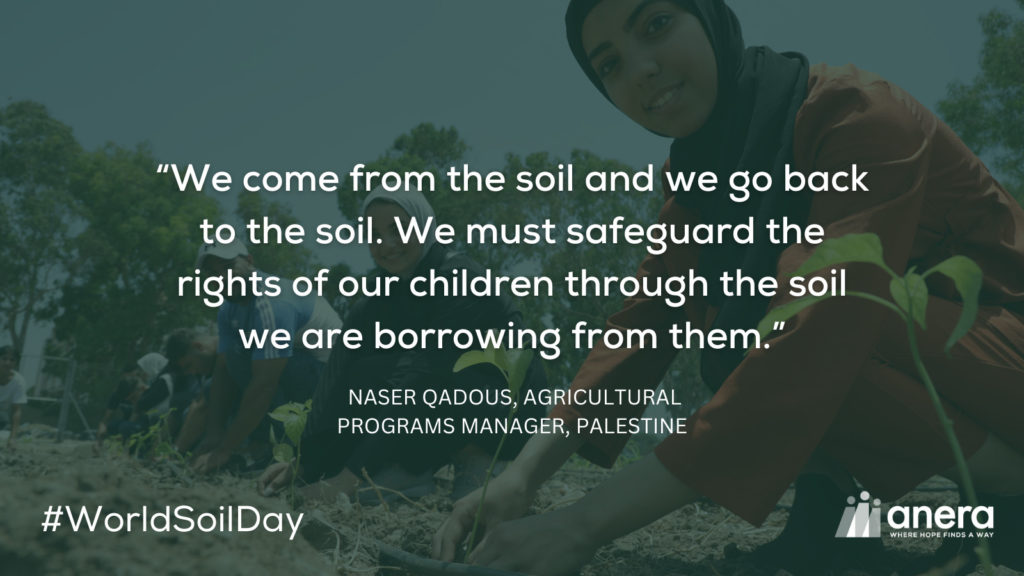

The health of the soil in Palestine has suffered over the past several decades, due to land access restrictions, over-farming of small plots, and use of damaging fertilizers.
Palestinian farmers are working to tackle the problems so they can keep up agricultural traditions that go back hundreds of years. Such solutions include innovative and sustainable technology, such as hydroponic gardens.
Nehad is one of the farmers in Palestine using hydroponic gardening to grow produce. Her primary goal with her garden is to feed her family and sell any leftover produce at the local market. Watch the video below to learn more.
World Soil Day 2021 in Palestine
By Hasan Ashqar
About the author: Hasan Ashqar graduated from the University of Jordan in 1994 with a specialty in soil and irrigation. Hasan works in the Palestinian ministry of agriculture as general director of planning and policies. He started his career there in soil management and irrigation. Now he works on agricultural development as it relates to natural resources and food security.
Palestinians in the West Bank only have access to 40% of their lands. The rest of it is in Area C, controlled by Israel. And, in the last few years, even more lands have been seized along the Wall with Israel. Palestinians only have available to them about 150,000 dunums (58 square miles) of irrigated land in total.
This means that smart use of natural resources – particularly land and water – is vital. In fact, if you go back to the ministry’s first strategic plan in 1998, you’ll see that the main priority was to improve efficiency in usage of natural resources. And, if you look at the strategic plan from 2019, you will see the same thing. It is an enduring challenge for us.
Types of Agricultural Cultivation in Palestine
We have two primary types of cultivation practices in Palestine. One is intensive cultivation on lands that are irrigated and have greenhouses. Though these farms represent only 12% of agricultural lands, they produce 80% of the plant production added value. The water farmers use for irrigation comes from springs and groundwater wells.
The other type of cultivation is on rain-fed lands, which account for more than 80% of our agricultural areas in the West Bank. It tends to be fragmented, terraced and supplementary irrigated from cisterns. In the northern West Bank, you will see almonds, cherries, apricots and other stone fruit trees. In the south, grapes and figs are more common. And olive trees grow everywhere in Palestine on these rain-fed lands.
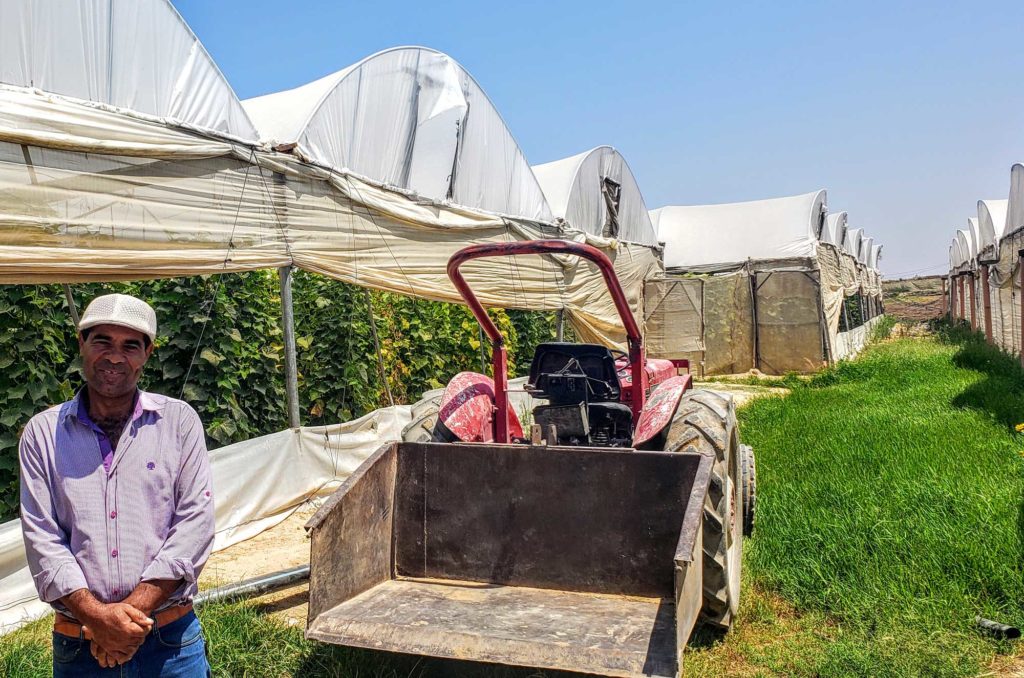

The Health of Palestinian Soil
Palestinian soil has suffered a lot in recent times. Because farmers have less and less access to their lands, they are forced to over-cultivate the irrigated agricultural fields. In the past 15 years the problem has gotten worse as Palestine has not been able to import fertilizers, because of Israel’s “dual use” rules – meaning that fertilizers containing nitrates and ammonia could be used as explosives. Farmers therefore only have access to potassium chloride from Israel as a fertilizer. Potassium chloride causes salinity in the soil, which just compounds a problem that already exists, particularly in Gaza and the Jordan Valley. Without a clean water source to leach out the salinity, the productivity of the soil is getting worse.
On the 80% of Palestinian lands that are rain-fed, the health of the soil is less of an issue. Rather the problem is gaining proper and efficient access to it. The cultivation technique most common on these lands is terracing, which Palestinians have been practicing since Roman times. There are many hillsides in the West Bank that are fertile possibilities for cultivation, but they have not yet been made usable and accessible.
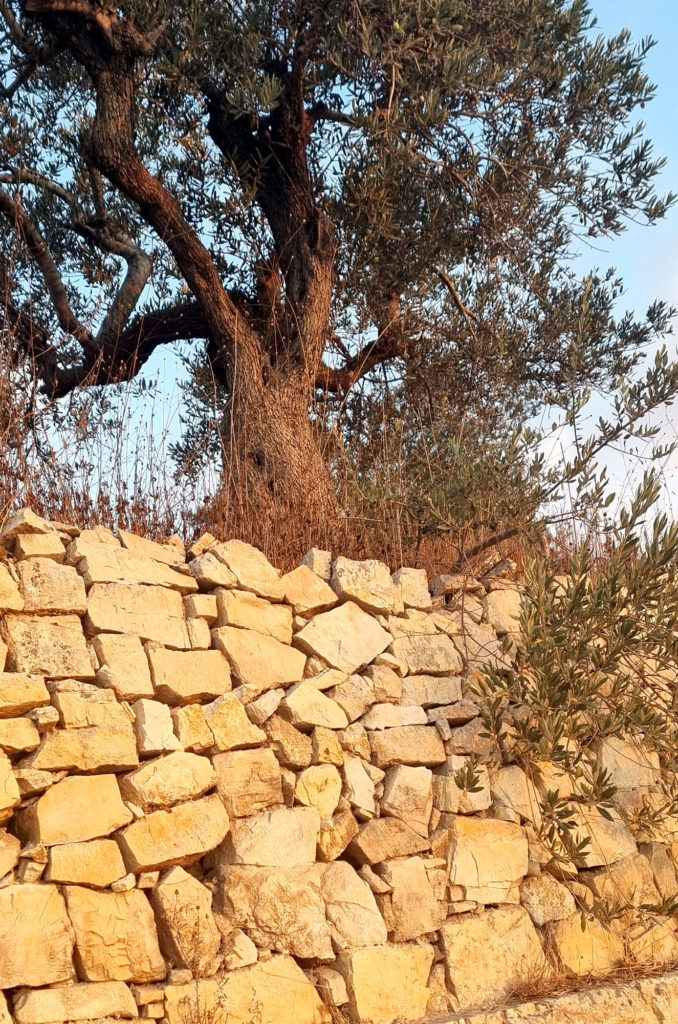

Improving Agricultural Cultivation in Palestine
Most of the ministry of agriculture’s budget goes to land development and reclamation as well as to water resource management. We are focusing on using treated wastewater more for irrigating trees and forage crops. This is a great resource we were throwing out. Now we have wastewater treatment facilities that link to agricultural fields (learn about Anera’s work in Jenin) and we are planning to build more.
The ministry is also experimenting more with soilless cultures for agriculture, like hydroponics and growing produce in pots using materials like peat moss and vermiculite. You especially will see this in the Jordan Valley and Gaza, where salination of the soil is such a problem. These techniques also use 50-70% of the water that traditional farming does.
On the lands that are rain-fed, the government is helping with land reclamation using the same historical terracing practices as have been used for thousands of years. This means removing rocks and boulders and building up terraces of walls along hillsides. We also are improving rainwater harvesting by installing more cisterns, which can be drawn from in the dry seasons. One cistern can serve 10 dunums (2.5 acres). This old, tried-and-true technique provides a safeguard against erosion, which is particularly important with climate change bringing more and more high intensity rains.
On these smaller, rain-fed plots of land, some farmers are experimenting with organic practices. They are reducing their dependence on fertilizers, pesticides and fungicides and spreading manure in olive groves.
Palestinians are of the Soil
If you ask about what our priorities are for soil and agriculture in Palestine, it is simply to provide for the basic needs of our people. What’s important is to focus on food security and human rights. We need to get more access to the lands available to Palestinians. We need to help our farmers responsibly develop their lands and improve their agricultural practices.
Soil is land. It’s about human rights. And you cannot discard human rights when they become politically inconvenient. Land ownership is important for Palestinians economically and socially. We treasure the soil of Palestine. We are from it and of it.
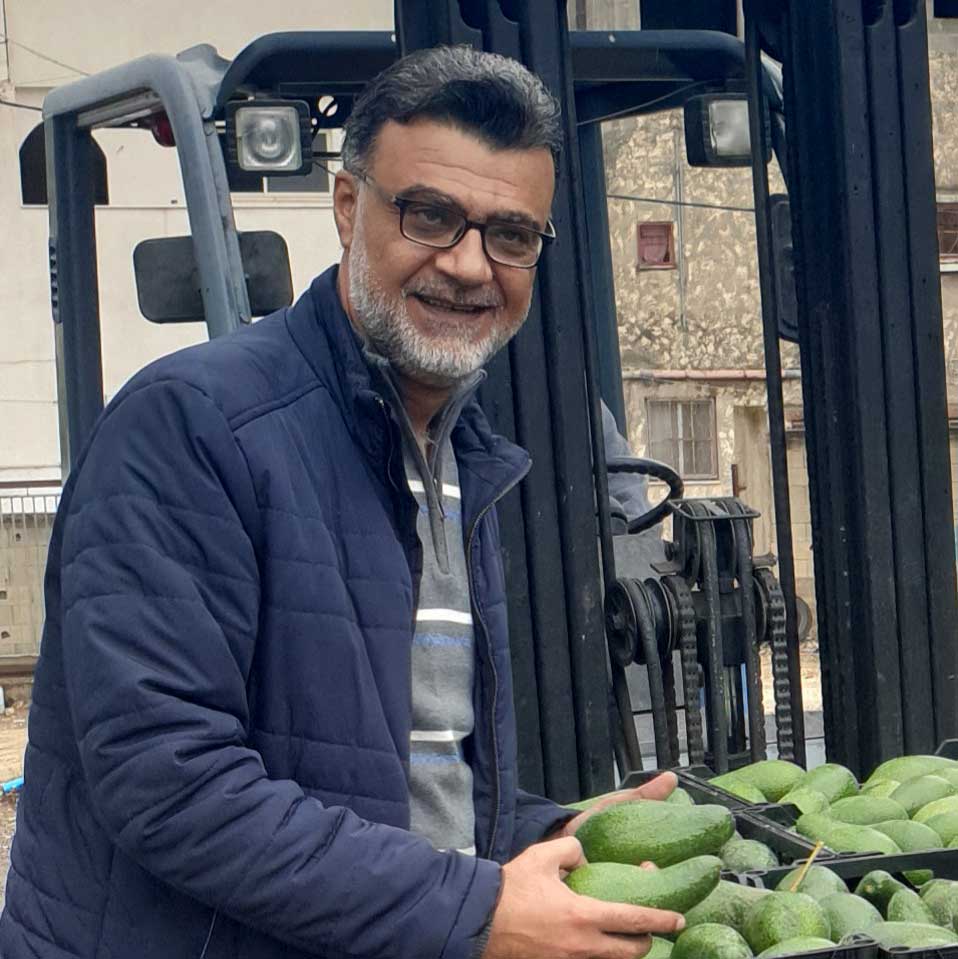

World Soil Day 2020: Protecting Palestinian Soil for Future Generations
“We come from the soil and we go back to the soil. We must safeguard the rights of our children through the soil we are borrowing from them.”
These poignant words come from one of our agronomists in Palestine, Naser Qadous. Naser in the West Bank and his colleague colleague Ibrahim Najjar in Gaza work to promote agricultural practices that protect the environment while helping Palestinian farming families get reliable access to lands and income.
In honor of World Soil Day, we feature here just four of the many ways that Naser and Ibrahim have improved the use and protection of soil.
1. Terracing
Terraced agricultural fields on steep hillsides conserve water and protect nutrient-rich soil from erosion. Palestinian farmers like to construct the walls from naturally existing stones, instead of concrete, as it is cheaper and at the same time permeable. The local stones allow water to flow out of the terraces during heavy rainfall to protect crops from flooding. Naser has worked with hundreds of farmers to keep this important tradition alive. Learn more about terracing>>
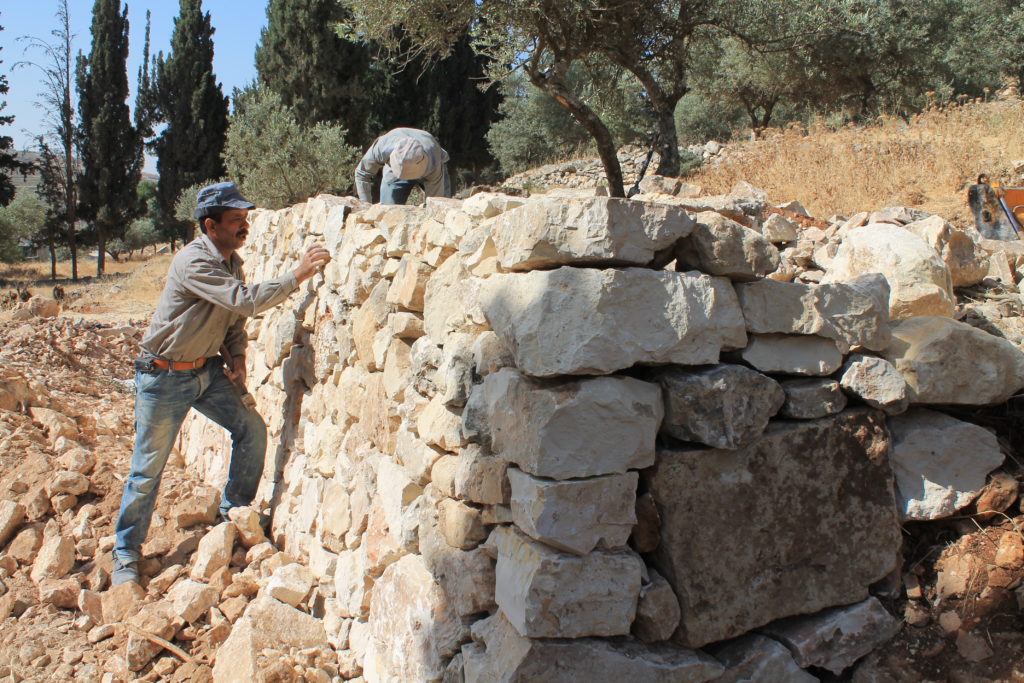

2. Hydroponic gardening
Hydroponic cultivation can play an important role in meeting food security challenges in Palestine. A small area can produce many fruits and vegetables at a very low cost with little more than PVC pipes and a small pump to circulate nutrients. The technique eliminates the need to use soil, which is particularly significant for Gaza, where much of the soil is polluted with heavy minerals or is so high in salinity that few crops can grow. Plus, hydroponic techniques avoid the need for pesticides. Our agronomist Ibrahim has recently overseen a pilot hydroponic garden in Gaza, which is providing ample produce to the women’s center on whose roof it is located. Learn more about hydroponics in Gaza>>
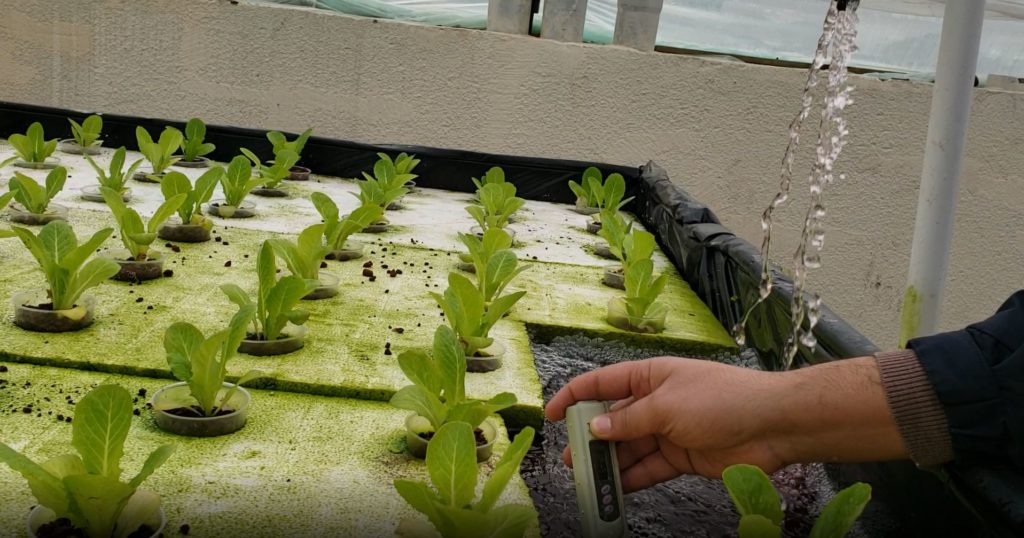

3. Training
Recently Ibrahim conducted five days of training on the safe use of pesticides, soil rejuvenation, and planting grafted seeds in Gaza. This is one of many such trainings that our agriculture specialists in Palestine have conducted over the decades. Naser also pioneered a knowledge-sharing program so that Palestinian farmers from Rafah, Gaza to Jenin, West Bank could learn from and mentor each other.
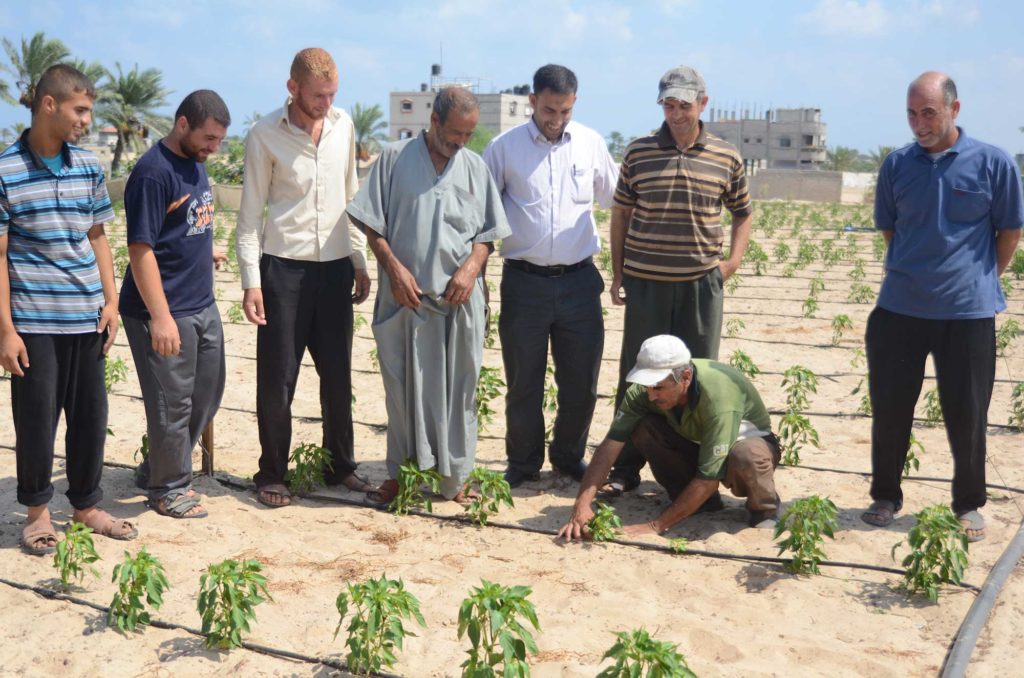

4. Grafting
The technique of grafting is environmentally friendly, requiring less fertilizer and pesticide use. This is pivotal for farmers in Gaza since it provides an alternative to unsafe methods of cleansing the soil. Conventional methods kill both harmful and beneficial bacteria in the soil and use excessive amounts of fertilizer. Grafting is a much better method to resist soil diseases. The high salinity of water in Gaza also affects farming. Some crops, like cucumbers, can’t be grown in the soil without irrigation. Grafting allows farmers to conserve water and get higher yields. Ibrahim relies on grafted plants for seedlings that he plants in family greenhouses across Gaza. Learn more about grafting in Gaza>>
Anera’s history with grafting goes back some years, when an insect called phylloxera infested the soil and devastated vineyards in Hebron. In the 1980s and again in the 2000s, with Naser’s oversight, Anera worked with a farming cooperative in Hebron to provide them with grafted disease-resistant grapevines. Learn more about grafting grapevines in Hebron>>
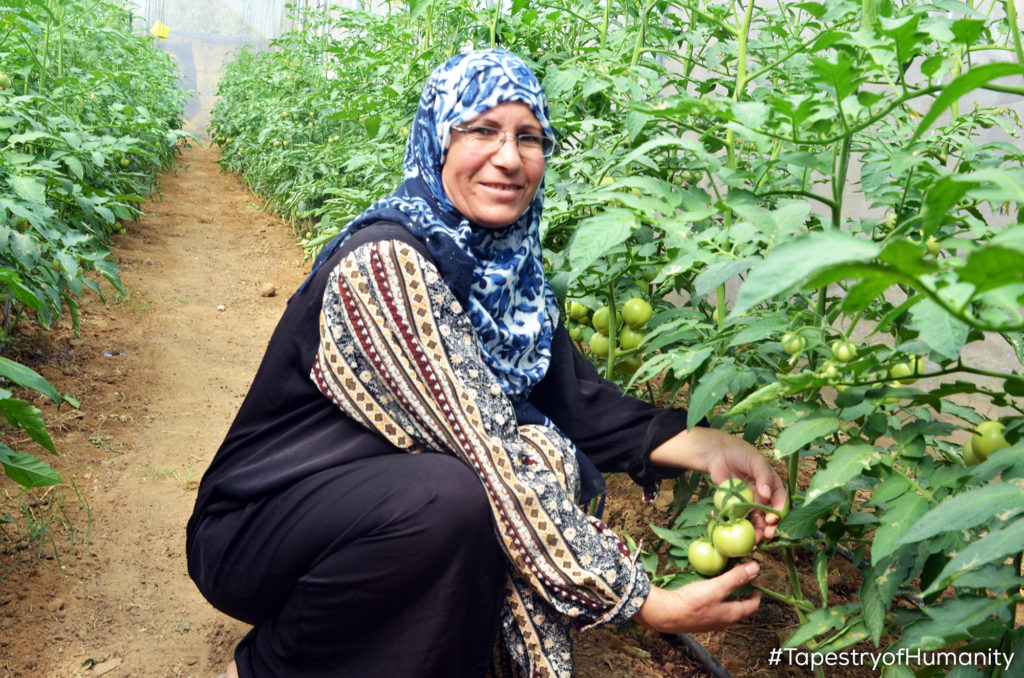

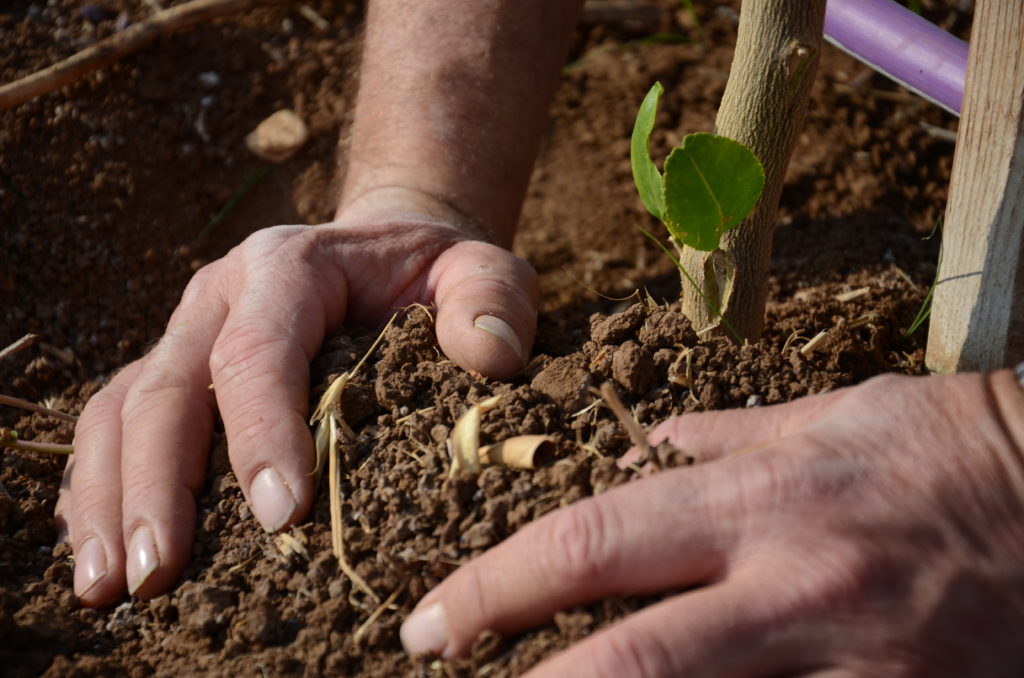

World Soil Day 2019: Restoring the Environment
by Naser Qadous is Anera Palestine’s Agricultural Programs Manager
To feed the world we need healthy soil.
Agriculture is almost totally dependent on water and soil. Aside from hydroponics, which is small scale, soil is essential for farming and much else. For me, soil is life itself.
For the West Bank and Gaza, there are big challenges facing soil and water resources. The biggest challenge is simple “access.” We Palestinians have a lot of land that we can’t access because of restrictions imposed by the occupation.
Soil Health in Palestine
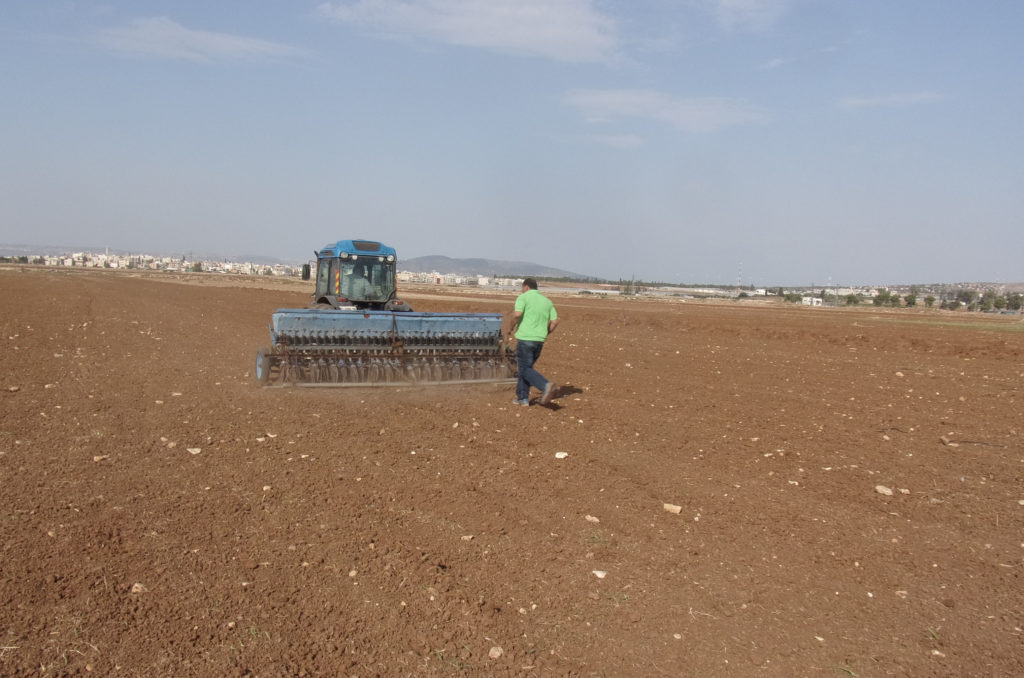

Soil is also suffering from farmers’ overuse. The available land accessible to farmers is very limited in Palestine so they tend to practice intensive farming, which means you are working the soil all the time and need to add lots of additional water, fertilizer and pesticides.
Farmers often don’t use best practices like crop rotation. For instance, this would mean that if you plant legumes this year, next year you should plant tomatoes and then wheat or barley the following year. This promotes good soil health.
For environmentalists — and I consider myself one — soil is a living organism. It needs care and it must be managed with this in mind. If farmers don’t care for their soil, it becomes degraded.
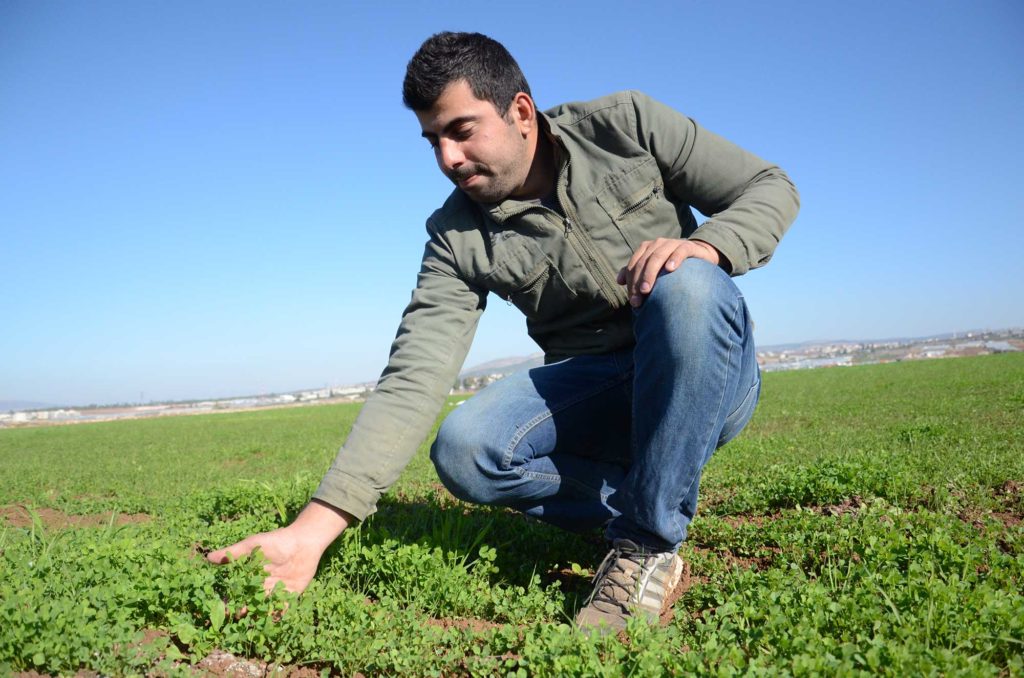

Soil Erosion in Palestine
Soil erosion is another issue in Palestine, and a problem worldwide. In our country, it isn’t heavy rains that cause it but rather a lack of vegetation and infrastructure to prevent it.
Overgrazing is also a problem. Sheep and goats visit the same land every day because of limited options. They eat all the plant growth and the resulting lack of vegetation worsens erosion.
Increasing salinity in scarce water resources is another challenge. In the West Bank, the Jordan Valley in particular has a problem with water salinity. In some areas here, the soil can only support a few crops because of it. Gaza, too, has a big problem with this. This is one reason tomatoes are so popular with our greenhouse farmers — it is one of the few crops that can tolerate high salinity.
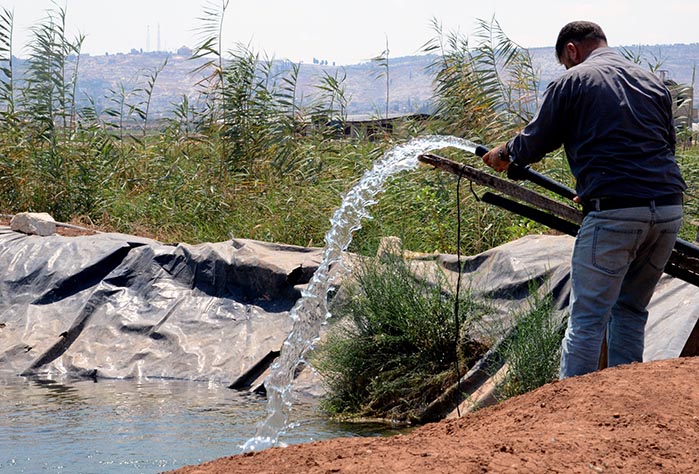

Protecting Palestinian Soil for the Future
How do we solve these problems? We must promote good farming practices and help farmers build more terraces. They also need alternative grazing areas for their livestock. For instance, years ago Anera planted forage crops in to help restore grazing area and save the soil in some hard-hit areas. Tree planting is also important.
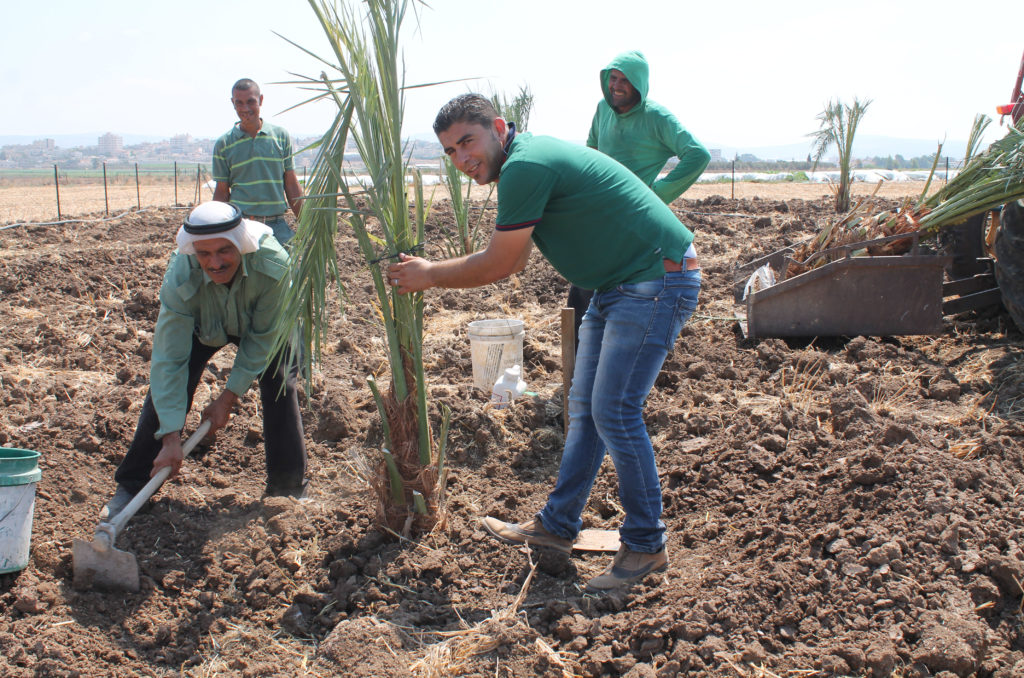

Farmers also need training on best agricultural practices on things like minimum tillage, composting, natural soil covers and mulching. Climate smart agriculture is something we need to do more to promote in our country.
There also needs to be more scientific research to classify the soils and lands to enhance academic understanding of the environment here and inform environmental interventions.
As humans, we come from the soil and we go back to the soil. We must safeguard the rights of our children through their soil “we are borrowing from them.”
